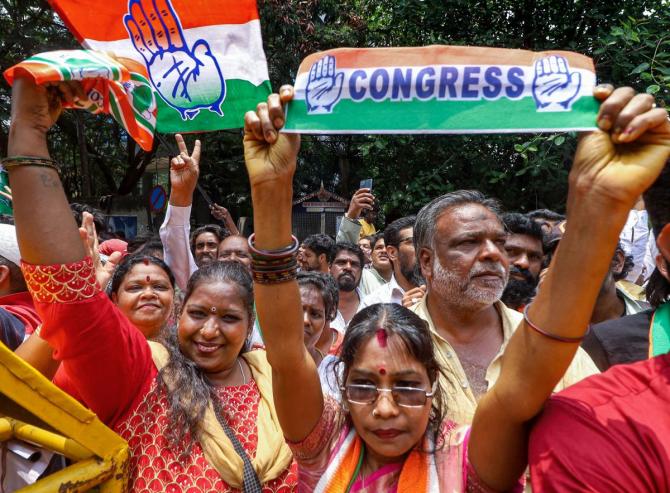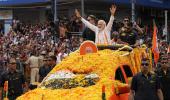Post-Karnataka, it would be a mistake to underestimate the BJP.
It should be amply clear by now that the Right-Wing is more an elaborate theatre than a single scene, actor or play, warns Shyam G Menon.

Many in India would have breathed a sigh of relief with the election results from Karnataka.
It is the biggest sign yet that the juggernaut of polarising politics, which has been India's Right-Wing, can be checked.
More than any other election result in recent times, this one signified political fortunes for the Congress, hopefully, altering.
Karnataka is an important state in terms of both political clout and contribution to the Indian economy.
More specific to the political tussle currently on in India, Karnataka has for a long time been the political Right-Wing's laboratory and launch pad in South India.
Some of the southern states, ruled as they are by non-BJP governments, will definitely feel relieved to see the BJP lose in Karnataka.
For those opposed to the BJP, it is however a victory that comes with a huge responsibility.
This was an election like few others for the Congress because in the months preceding the polls, party leader Rahul Gandhi was targeted by the BJP and eventually the MP from Wayanad, was disqualified from Parliament.
The related legal battle is still on.
Even as the Congress fought the Karnataka polls with such disadvantages to its credit, by most accounts, it ran a campaign that focused on the people's unhappiness with the BJP state government.
That was the master stroke yielding dividends.
However, as the political influence of the Congress slowly revives, the party must be utterly careful to calibrate its celebrations with reality.
And its growing stature, with efforts currently on for Opposition unity.
For although Karnataka may seem an end in itself, 2023-2024 features assemblies in several states completing their tenure and requiring fresh polls -- aside from Karnataka, there is Rajasthan, Madhya Pradesh, Chhattisgarh, Telangana and Mizoram.
Elections to Houses in Meghalaya, Nagaland and Tripura have already happened.
In Rajasthan, the Congress seems to have its hands full dealing with leadership issues.
Even if Saturday's result may be construed as strengthening the hands of the party's central leadership to deal with such matters, feeling elated and getting carried away by the outcome in Karnataka, would be premature.
There is a long way to go -- a long walk if you will -- before issues in the Congress's own ranks are properly addressed and India's misdirected excursion to the political Right -- at least in the form the country got to know it -- is satisfactorily leashed in.
On Saturday, for reasons best known to him, Congress leader and former Karnataka chief minister Siddaramaiah expressed his hope that Rahul Gandhi would become prime minister.
This is exactly the sort of statement one wishes is not heard right now, given the ensemble of fragile egos that is the larger Opposition.

Post-Karnataka, it would be a mistake to underestimate the BJP.
It should be amply clear by now that the Right-Wing is more an elaborate theatre than a single scene, actor or play.
As perceived from the outside, equations within this multi-layered set-up keep shifting all the time with long term devotion being only to the script and the agenda.
So, while the BJP may find itself on the backfoot by the election result in Karnataka, the more permanent apparatus of the Right-Wing as represented by the Rashtriya Swayamsevak Sangh and its adjunct outfits which serve as committed cadre for the Right-Wing will continue their work.
It's the safety net that will keep the BJP alive and its work going on, despite loss.
To that extent, the southern states (or indeed any non-BJP state) would be foolish to let down their guard just because the BJP lost in Karnataka.
Further, unlike any previous central government, the administration led by Narendra Modi and Amit Shah had kept the Opposition in check by multiple means.
Official agencies investigated several political foes.
Opposition politicos found themselves harassed and cornered.
The public does not know the details of many of these exercises.
This is a critical variable in plans for Opposition unity in the run up to the 2024 elections.
One cannot foresee what pressure and baits will be used and how some of the opposition leaders will behave amidst calls to stand united.

Equally critical to note is that nowadays, Indian politics and administration is distinctly felt as the sum total of impacts felt at local, state and national level. Relevance lay at the local level.
Work at this level has real, memorable effect.
This quality tapers up the pyramid. Surfing on impression is strongest at the national level.
When a party wins a state, it signifies only that layer and impact by it, secured.
Local politics (basically panchayat, municipal and corporation politics), which affects daily life more, may still be with others.
The point is not that a party should dominate everywhere (like the BJP with its appetite for homogeneity tries to do); point is - a party must have a realistic picture of what it won and where it stands.
There is no more, no less. For the Congress, Karnataka is only a beginning towards 2024, but an important beginning.

Notwithstanding Saturday's results, a long yatra remains.
Unlike a city marathon where people chase personal best timings and are over with the event in a few hours, the Bharat Jodo Yatra was a case of modest distance walked every day and goal systematically reached.
It was a bit at a time, repeated consistently.
That's the only way to approach the general election of 2024.
Anything less may end up in potentially lost opportunity.
As some pointed out in the build up to the Karnataka polls, the damage done to Indian politics by the BJP and its ways, is so immense that allowing it to rule beyond 2024 risks damaging more than just Indian politics.
Averting such danger should be the electorate's top priority.
Will the Opposition, boosted by the Congress performance in Karnataka, live up to the electorate's expectations?
Shyam G Menon is a freelance journalist based in Mumbai.
Feature Presentation: Aslam Hunani/Rediff.com









